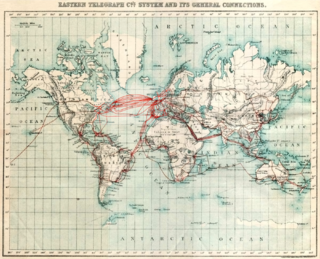
Victorian Internet
Encyclopedia

Tom Standage
Tom Standage is a journalist and author from England. A graduate of Oxford University, he has worked as a science and technology writer for The Guardian, as the business editor at The Economist, has been published in Wired, The New York Times, and The Daily Telegraph, and has published five books,...
. It is about the development and uses of the electric telegraph during the second half of the 19th Century
19th century
The 19th century was a period in history marked by the collapse of the Spanish, Portuguese, Chinese, Holy Roman and Mughal empires...
and some of the similarities the telegraph shared with the Internet of the late 20th Century
20th century
Many people define the 20th century as running from January 1, 1901 to December 31, 2000, others would rather define it as beginning on January 1, 1900....
. The central idea of the book posits that of these two technologies, it was the telegraph that was the more significant, since the ability to communicate globally at all in real-time was a qualitative shift, while the change brought on by the modern Internet was merely a quantitative shift according to Standage.
Contents
The book describes to general readers how some of the uses of telegraph in commercial, military, and social communication were, in a sense, analogous to modern uses of the internet. A few rather unusual stories are related, about couples who fell in love and even married over the wires, criminals who were caught through the telegraph, and so on. The culture which developed between telegraph operators also had some rather unexpected affinities with the modern internet. Both cultures made or make use of complex text codingCoding
Coding may refer to:* Channel coding in coding theory* Line coding* Computer programming, the process of designing, writing, testing, debugging / troubleshooting, and maintaining the source code of computer programs...
and abbreviated
Commercial code
Commercial code might refer to:*Commercial code , a set of laws designed to regulate comemrce*Commercial code , a code used in telegraph and telex messages....
language slang
Slang
Slang is the use of informal words and expressions that are not considered standard in the speaker's language or dialect but are considered more acceptable when used socially. Slang is often to be found in areas of the lexicon that refer to things considered taboo...
, both required network security
Network security
In the field of networking, the area of network security consists of the provisions and policies adopted by the network administrator to prevent and monitor unauthorized access, misuse, modification, or denial of the computer network and network-accessible resources...
experts, and both attracted criminals who used the networks to commit fraud
Wire fraud
Mail and wire fraud is a federal crime in the United States. Together, 18 U.S.C. §§ 1341, 1343, and 1346 reach any fraudulent scheme or artifice to intentionally deprive another of property or honest services with a nexus to mail or wire communication....
, hack
Hacker (computer security)
In computer security and everyday language, a hacker is someone who breaks into computers and computer networks. Hackers may be motivated by a multitude of reasons, including profit, protest, or because of the challenge...
private communications, and send spam
Spam
Spam may refer to:* Spam , a canned pork meat product* Spam , unsolicited or undesired electronic messages* E-mail spam, unsolicited or undesired email messages* "Spam" , a comedy sketch...
messages.
External links
- Tom Standage on the Victorian Internet
- Summary of the book: Victorian Internet
- "Mr Lincoln's T-mails" or telegrams
- Speaking of History Podcast interview with Tom Wheeler, author of Mr. Lincoln's T-Mails - How Lincoln Used the Telegraph to Win the Civil War
- Distant Writing - The History of the Telegraph Companies in Britain between 1838 and 1868
- Telegraphy Victorian Patents and Inventions

